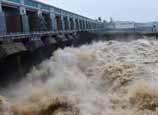
GUIYANG, July 21 (Xinhua) -- By putting an eco-court, an eco-procuratorial bureau and an eco-public security branch into operation earlier this year, Guiyang, capital city of an underdeveloped inland province, is leading China in building a justice system that involves all three arms of judicial forces to promote ecological progress.
Serious pollution in the city led to the establishment of an environmental court in Guiyang at the end of 2007, the first court of its kind in the country. Today, China has more than 130 environmental courts nationwide, as pollution has become a more prominent issue that needs tackled.
"Setting up specialized ecological courts could break the limitations of administrative areas and reduce interference from various parties," said Luo Guangqian, the environmental court's presiding judge.
In the past five years, the court had concluded 619 environmental cases involving water, land and air pollution, punishing 477 polluters. Among them were 13 major public interest environmental litigation cases, which account for half of such cases nationwide.
"For a long time, China has mainly relied on administrative measures to manage and supervise environmental affairs and curb pollution," said national legislator Wang Qingxi, noting that judicial forces have been playing a relatively minor role in environmental protection.
The results proved unsatisfactory, as China has faced worsening pollution problems in its air, soil and water and the public has become less tolerant of environmental hazards.
Apart from innovative local measures, judicial forces, responding to public calls to play bigger role, are also gaining momentum in ecological protection at the national level.
Last month, the country's supreme court and procuratorate jointly issued a new judicial explanation aimed at easing difficulties in investigating environmental pollution cases and convicting polluters by setting down more precise criteria for convictions and sentencing.
In addition, the draft amendment to the environmental protection law, tabled for a second reading last month at the country's top legislature, adopts harsher punishments for polluters and highlights the public's right to know and participate.
The bill also introduces public interest litigation by authorizing the All-China Environment Federation and its provincial branches to initiate lawsuits against polluters on behalf of the public.
Wang Jin, director of the Resource, Energy and Environmental Institute under Peking University, said, "Specifying an organization as a public litigation subject may be defective, but the draft gives a direction for future development for other public interest groups."
Public interest litigation in environmental law is now well accepted in many developed and developing countries, said Ben Boer, professor emeritus at the University of Sydney and a professor with the Research Institute of Environmental Law under Wuhan University.
"There must be a legal mechanism for the public to bring legal action in court in the interests of the public," because large numbers of people are affected by pollution and other environmental impacts and government agencies cannot always deal with all aspects of environmental degradation, he said.
Some organizations in China, such as the All-China Environment Federation (ACEF) and Friends of Nature, have already brought public interest litigation.
The ACEF has filed 14 public interest lawsuits on environment-related issues since 2009.
As environmental courts in China are still fairly young, they have their problems to work through, such as securing adequate resources, overcoming difficulties in ensuring that their jurisdiction is broad enough and accessing appropriate expertise -- issues an Australian judge described as "growing pains."
Michael Rackemann, a judge with the Planning and Environment Court of Queensland, visited China's first environmental court in Guiyang earlier this week.
"There's more to having an environmental court than just creating one," Rackemann said. The courts must be given sufficient jurisdiction, and it's very important for the judges on those courts to develop an understanding of issues and become environmentally literate, which can be achieved through experience and judicial training, according to Rackemann.
Zhan Simin, vice president of Guangzhou Maritime Court, said high costs in obtaining evidence have reduced the number of environmental lawsuits.
In one of the court's cases, it cost 250,000 yuan (about 40,743 U.S. dollars) to get evidence, but the polluter, a local garment factory, was only ordered to give compensation of 170,000 yuan, according to Zhan.
Sun Youhai, director of the China Institute of Applied Jurisprudence of the Supreme People's Court of China, said that although there are many environmental disputes in the country, only a few were taken to court because of the high threshold for filing lawsuits and difficulty in obtaining evidence.
"There is still great room for China to enhance its environmental judicial system and legislation, despite progresses already made," Sun said.
















 Floodwater gushes from sluices of Gezhou Dam, China's Hubei
Floodwater gushes from sluices of Gezhou Dam, China's Hubei


![]()
